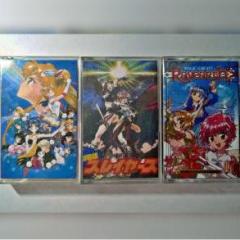Leaderboard
Popular Content
Showing content with the highest reputation on 02/27/19 in all areas
-

100 Visual Novels Played Ain't a Damn Thing Changed
Plk_Lesiak and one other reacted to Ranzo for a topic
So, after around 10 years off on and off playing I finally managed to clear the 100 VN threshold and I can honestly say that I'm shocked that I've kept up with it for this long. I started playing around 2009 after blindly stumbling upon the genre whilst on my frenzied quest to find more Galaxy Angel content. What really drew me in was the uniqueness of the medium and the potential for really great storytelling. I was liked how romance was really emphasized which was not the case for most of the video games that I've played.(Except for the Bioware fare which to be honest was not always that substantial) It was like I had found a new frontier and I decided I would plunder it for anything I deemed of worth. I've played a lot of lot of truly great vns that inspired and influenced me and some pretty shit ones that I wished I could scrub my brain of all knowledge of. Thanks to my relatively discerning taste that hasn't been that many, usually it was anytime I decided to play an H game. I'd like to say that I've kind of learned my lesson but we all know that's not the case. Now, if you'd excuse me, I need to find another vn to play. Anyway, I guess this is the part where you ask me a question, or crow about how you have already played 100 vns and you only started last year, or some other dumb shit.2 points -
So, I've recently finished reading Chrono Clock, and I really want to see what other people think about the title as well as share some thoughts. In my opinion is was a pretty good read and (apart from Miu's "route" and the way Misaki was written) I had no issues with it. As far as the list of characters, for me it's: Michiru > Cro > D.D. > Makoto > Misaki When it comes to the routes themselves, the order changes a little: Cro > Michiru > Makoto > D.D. > Misaki Now I generally like tsunderes but Misaki really felt like a bland character. Her route was a bit lacking as well compared to the other characters in my opinion. Regarding Miu's route its, Prologue didn't do justice to the character and it was mildly disappointing that she lacked a proper arc. That's also the reason I can't really put her anywhere on the list. She felt like a side character by the time I've unlocked her ending. D.D.'s route while a bit cliche, was a solid read nontheless. Also, her dialogues were great which made me like her as a character. Michiru personality-wise was a really well written static character and I've come to like her and her route very much. Makoto's route was the first one I've played through and while plot is good, it was a bit uncomfortable to read and one could criticise choices that characters made and call them illogical. When it comes to Cro's route it was a very pleasant surprise to me, as it not only gave other characters some depth, but also re-introduced Cro in a natural manner.1 point
-
Intro This is just a random idea I had. So every so once in a while I see people who are interested in reading Japanese-only visual novels and consider using something like Visual Novel Reader or some kind of other way to machine translate the VN for them. I then see people who respond that machine TLs are bad and that they should just learn Japanese. As someone who's started learning Japanese last year and have been making ok progress, I wanted to show the differences of how someone learning Japanese could read a sentence based on comprehension vs. how a machine translator like Visual Novel Reader (using LEC and ATLAS dictionaries) and Google Translate would translate the same sentence. I'm not gonna sit here and be one of those JOP shills who say JUST LEARN JAPANESE. I'm just gonna provide the analysis and comparison and let the people decide if the differences don't matter to them or if they want to get inspired to learn Japanese if they really want to. Remember, learning a second language isn't easy and you gotta put in the work which takes time and practice and sacrifice. ---------------------------------------------------------- Details about the Demonstration The Visual Novel I'm going to use for this demonstration is my first visual novel I'm currently reading in Japanese: Kanojo to Ore to Koibito to. This is a slice of life moege so it should be easier to digest than a visual novel with a lot of plot. I'm not gonna translate a whole scene because that would take multiple posts. Instead, I'm taking 10 lines of a simple conversation and posting them in the order they appear. For the purposes of my interpretations, I'm going to be using a combination of Jisho and Weblio to look up vocabulary and Taekim's Grammar Guide and other sites to confirm proper grammar usage. I'm not going to give an explanation for every single personal translation, but if you're a seasoned Japanese reader and want to correct me on things that look wrong, feel free as I'm still learning. I'll also be pointing out any positives or negatives of the machine TLs. I'm not just going to shit all over machine TLs because I want to see what positives they may offer. Context for this scene (no spoilers, this is the third scene in the whole VN) (Note: Context is VERY important for translating/reading properly in Japanese. Which you will soon see.) The day before, Haruto saved Ayano when he jumped out in front of an errant vehicle that was heading for her, but he got hurt in the process. He got put in the hospital because of it and Ayano visited him and they basically hit it off. Note they had never met before this occasion. She promised to keep visiting him every day until he got better. The scene below is the day after Haruto got put in the hospital. Ayano just knocked on the door to his room. Another thing to note is that Haruto has a more casual way of talking, while Ayano is much more polite. Polite vs casual speech is another thing to take note of in the language. Full Names: 松上 遥人 Matsugami Haruto 美萩野 綾乃 Mihagino Ayano ---------------------------------------------------------- Line 1 Haruto -「はい、どうぞー」 Romaji: Hai, douzoー 1 to 1 translation: 「Yes, go aheadー」 Personal Translation: 「Come inー」 Visual Novel Reader, LEC: 「Yes. Certainly」 Visual Novel Reader, ATLAS: 「Yes,Please」 Google Translate: "Yes, please." Analysis: So どうぞ is one of many words that have potential multiple meanings: https://jisho.org/search/douzo. It's a simple word that depending on context either means "feel free to ___" or "please" or "Here you are". The machine translated sentences clearly used the meaning that goes against the context of the situation. Just because the meanings they chose are probably more common, doesn't mean it's the go to meaning to use for all situations. ---------------------------------------------------------- Line 2 Ayano - 「失礼いたします」 Romaji:「Shitsurei itashi masu」 1 to 1 translation: 「Excuse me.」 Personal translation: 「Excuse me.」 Visual Novel Reader, LEC: 「I leave」 Visual Novel Reader, ATLAS: 「I will be must be going.」 Google Translate: "excuse me" Analysis: 失礼いたします (or 失礼します) is a common phrase for entering or leaving rooms or conversations/people. LEC and ATLAS seemed to assume it was for someone leaving. Once again, it may be the more common usage of the word but does not mean it's the only usage of it. Also, the English grammar usage in some of the machine translations are pretty funny to look at. ---------------------------------------------------------- Line 3 Narration - 入ってきたのは、花束を持った美萩野さんだった。 Romaji: Haittekita no wa, hanataba o motta Mihagino-san datta. 1 to 1 translation: Coming in, bouquet held Mihagino-san was. Personal translation: It was Mihagino-san coming in holding a bouquet. Visual Novel Reader, LEC: It was Mihagino with the bouquet to have entered Visual Novel Reader, ATLAS: It was Mr. Mihagino that had entered who had had the bouquet. Google Translate: It was Mr. Mikagino with a bouquet that came in. Analysis: DID YOU JUST ASSUME HER GENDER? As you can see, a few cases of machine translation will see the "san" honorific and automatically assume it's a guy. In addition, apparently google translate isn't always good for showing names. Spotty English grammar and gender aside, the machine TLs actually covered the main point of the sentence pretty well. ---------------------------------------------------------- Line 4 Haruto - 「あ……っと、美萩野さん」 Romaji: 「A...tto, Mihagino-san」 1 to 1 translation: 「Ah... Oh, Mihagino-san」 Personal translation: 「Ah... Oh, it's Mihagino-san.」 Visual Novel Reader, LEC: 「...Mihagino」 Visual Novel Reader, ATLAS: 「Mr. Mihagino」 Google Translate: "Ah ... ... well, Mr. Mikagino" Analysis: More gender assuming. Also it looks like machine translators aren't good with single characters that seem out of place. And Google still doesn't like names. ---------------------------------------------------------- Line 5 Ayano - 「お見舞いにうかがったのですが、お邪魔ではありませんか?」 Romaji: 「omimai ni ukagatta no desuga, ojyama de wa arimasenka?」 1 to 1 translation:「Calling on someone who is ill to visit expected that, interrupt to be not?」 Personal translation: 「I'm visiting you since you were sick. I hope I'm not disturbing you?」 Visual Novel Reader, LEC: 「I asked a visit, but to not disturb it?」 Visual Novel Reader, ATLAS: 「It will be obstructive through looked to the visit.」 Google Translate: ""I was caught asking you, is not you in the way?"" Analysis: This is a case where context in the Japanese language is very important. Since pronouns aren't used for most sentences, the listener has to infer what or who is being referred to in the dialogue. It looks like machine translators either guess which pronouns to use or don't even use personal pronouns at all. ---------------------------------------------------------- Line 6 Narration - 驚きが顔に出てたのか、美萩野さんは申し訳なさそうに聞いてくる。 Romaji: Odoruki ga kao ni deteta no ka, Mihagino-san wa moushiwakenasazou ni kitekuru. 1 to 1 translation: Surprise face made?, Mihagino-san apologetically asks. Personal translation: I must have made a surprised face as Mihigano asked that apologetically. Visual Novel Reader, LEC: Mihagino hears whether surprise was reflected on a face apologetically. Visual Novel Reader, ATLAS: Did the surprise appear to the face? Mr. Mihagino hears it seeming to apologize. Google Translate: Did Mr. Mikagino ask a little sorry for surprise appearing on the face? Analysis: In Japanese grammar it's possible to ask a question in a larger sentence that may not end as a question. It's a bit difficult for me to translate that personally. If the machine translators actually translated the other words in the sentence better, I think they had the right idea with translating embedded questions in the middle of a longer sentence. ---------------------------------------------------------- Line 7 Haruto - 「いや、そんなことない。全然ないからっ」 Romaji: 「Iya, Sonnakotonai. Zenzennai kara」 1 to 1 translation: 「No, that's not true. Not at all not so」 Personal Translation: 「Nah, that's not true. You're not disturbing me at all.」 Visual Novel Reader, LEC: 「No, there is not such a thing. Because there is not it at all.」 Visual Novel Reader, ATLAS: 「Unpleasantness. Such a thing. Because it is not at all.」 Google Translate: "No, that's not true. It is not at all" Analysis: "そんなこと" literally means "such a thing" which is what some of the machine translations go for. Generally in actual sentences you mostly won't be saying "such a thing" but rather work around the current topic of the sentence. As you can see, the negative version can be used to just say something isn't true, so it's another case of a phrase having multiple meanings or interpretations. ---------------------------------------------------------- Line 8 Ayano - 「ありがとうございます。それでは、失礼いたします」 Romaji - 「Arigatou gozaimasu. Soredewa, Shitsurei itashi masu.」 1 to 1 translation: 「Thank you very much. Well then, excuse me.」 Personal Translation: 「Thank you very much. Well then, excuse me.」 Visual Novel Reader, LEC: 「Thank you. Then I leave」 Visual Novel Reader, ATLAS: 「Thank you. Thank, I will must be going.」 Google Translate: "Thank you very much, then I will excuse you." Analysis: Another case of 失礼いたします meaning being assumed. At least the pronouns were mostly correct. ---------------------------------------------------------- Line 9 Narration - 持ってきてくれた花を花びんに生けると、前と同じようにベッドの脇の椅子に座った。 Romaji - Mottekitekureta hana o habin ni ikeru to, mae to onajiyou ni beddo no waki no isu ni suwatta. 1 to 1 translation: Brought flowers vase in arrange when, same as before bed's side's chair sat. Personal Translation: After she arranged the flowers she brought in a vase, she sat on the chair besides the bed like last time. Visual Novel Reader, LEC: I sat down on a chair beside the bed in the same way as the front when I arranged the flower which I brought in a vase. Visual Novel Reader, ATLAS: When the brought flower was arranged in the vase, it sat as much ahead on a sideward chairs of the bed. Google Translate: When I lived on a flower with the flowers that brought me, I sat on the chair next to the bed just as before. Analysis: Once again, the general idea is conveyed in the machine TLs but the issue is slight grammar issues as well as assuming pronouns which change the direction of the sentence. ---------------------------------------------------------- Line 10 Haruto - 「ありがとう。来てくれて、嬉しいよ」 Romaji: Arigatou. Kitekurete, ureshii yo 1 to 1 translation: Thank you. Coming, I'm glad. Personal Translation: Thank you. I'm glad you came. Visual Novel Reader, LEC: Thank you. I am glad to come Visual Novel Reader, ATLAS: Thank you. I am glad to come. Google Translate: "Thank you, I am glad you came" Analysis: Google Translate basically got it perfectly in my eyes. LEC and ATLAS unfortunately used pronouns in the incorrect way again which turned the sentence into something more lewd sounding. ---------------------------------------------------------- Conclusion It seems like the machine translations get the right idea of how to translate the sentence in terms of easier vocabulary and grammar. However, it seems like it struggles with some major things 1) Words/Phrases with multiple meanings. It takes what's the most common usage of the meaning of the word but since it can't read context, there's a chance what it translates a word/phrase to is incorrect for the situation. 2) Prounouns. As I said, unlike the English language where we basically have to put pronouns everywhere, you don't actually do that a lot of the time in Japanese language. You have to infer it based on the situation. Machine translations can't possibly know the context so it will take a guess. 3) Assuming genders with honorifics. 4) Apparently some names don't get printed out well sometimes. My guess it would be worse with characters that have names that would actually translate to English well like "小鳥" would become "small bird" instead of "Kotori". 5) Arranging sentences with clean English grammar. Usually the translation has grammar that could work, but is just not the most pleasant/common to read.1 point
-

What are you playing?
yelsha57 reacted to PrincessOfFinch for a topic
I've been playing Subarashiki Hibi all day. I've only just got to It's My Own Invention but man, this VN is amazing so far. I'm in love1 point -

What Anime are you watching now?
Plk_Lesiak reacted to ittaku for a topic
I watched Sukitte Ii Na yo - Say I love you. This was a little gem of a romance that somehow had flown under my radar till now. It was clearly shoujo romance which seems to always be more satisfying than anything written for boys. The latter half wasn't quite as good as the first half, with lots of convenient stereotypical resolutions to the various dramas but it was still a delight to watch and ultimately satisfying. 8/101 point -

Show yourself off (RL picture thread)
Kenshin_sama reacted to PrincessOfFinch for a topic
Boop https://ibb.co/B6BtT8d https://ibb.co/jyGFFDG https://ibb.co/BPtmgCR1 point -

Chrono Clock Poll & general discussion.
Nighty reacted to MeguminBlast for a topic
My personal ranking would be Cro > Misaki > Makoto > Michiru > D.D And for routes the sams thing. Cro's route, IMO, was the best. Felt like it tied the whole VN together well and the ending was sweet. Misaki's route I loved for how fluffy it was (which one of the reasons I picked up CC was just to read something light-hearted and fluffy) and I liked how her and Rei's relationship was shown. Makoto's route I loved the action and I would've ranked it above Misaki but the route itself felt short and left me wanting more. Michiru's route I wasn't too huge a fan of since I don't really like little sister heroines (esp. when they're blood-related), but ignoring the incest aspect I loved how the drama was presented and how well the ending was. I didn't really like D.D that much nor her route, she annoyed me during the common route and while I started liking her a bit more in her route, the drama felt really out of left field and made me dislike it. I didn't include Miu cause yeah I agree with you, her route was barely a route and she was barely a character herself after the prologue. Hell, I actually got annoyed with how they would start talking about how great she was in some of the other routes cause she'd barely had appeared despite being a close friend to Michiru and Misaki. Also, something I found funny is how every heroine has the credits show CGs over a clock with the slow credits music, while her credits is just a plain credits scroll agaisnt a white background with the OP playing. Also, how he gets with her was just stupid, especially after coming off of Cro's route.1 point -

Lamunation! [OUT NOW!] by Love Lab
yelsha57 reacted to littleshogun for a topic
Late to say this. Congratulation to the team now that they'd been finished with the translation, and I hope the works after this would go smoothly. Good luck to the team there.1 point -
Irotoridori Kickstarter by Sol Press Funded at over 85k
yelsha57 reacted to Incynerate for a topic
Yeah, it looks like very few people went for the higher-$ physical tiers. It seems like they either weren't priced very well or aren't things people were interested in getting. Somebody did pledge the $5k tier, but it sounds like that was somebody on /vn/ who probably wasn't serious. I think Doddler raised some good points on Twitter. Sol Press probably got a good number of the hardcore VN audience in the first couple days but doesn't have the reach to hit a wider audience, like JAST or Sekai has. Maybe an English title and logo would have helped with that wider appeal. If they try this again they might need to rethink the reward tiers and get a promotional partner.1 point -
It doesn't have to be that super realistic. That's not what I meant. It's just that very often the characters are someone else during those scenes and after that they are back to their old selves. What makes this so story breaking is the feeling that when you get to those scenes it's like: Story end - begin fanservice - end fanservice - continue story. The flow is interrupted and I hate that. But I guess there's also a lot of people looking forward to those moments. I simply wonder sometimes why there isn't an option to toggle those scenes, then everybody would be happy- like they did in Komyu. and about the 18+ thing... you know how that goes1 point
-

A question to those who read untranslated Japanese VNs
AustriaVNFan reacted to adamstan for a topic
If I may, let me share my current experience - I think this would be proper thread, as it's less about VN, and more about the process of reading. Currently I'm reading ToHeart PSE for about a week. I'm using Textractor + Chiitrans for looking up unknown words (with furigana switched off ). First two or three days were rather slow and exhausting, but now it got pretty smooth - not much slower than when reading translated ones (but I have to admit I don't rush through them, always listening to the voices etc). I started to get used to characters' speech patterns, remember some of the new words that reappear often etc. It's actually really amazing feeling - and it got me by surprise. While there is still odd sentence here and there that flies over my head, I got pretty comfortable with this VN. Of course, there's possibility that I'm just at easy segment of script But, contrary to what some people are claiming, apparently you don't have to study for 5+ years to be able to read untranslated VNs without relying on MTL and have fun with it Also, I found "Dictionary of basic japanese grammar" really helpful, as an addition to other resources.1 point -
I tried auto mode while i snack but i always end up going back to the push-to-continue model because I seem to require a variable amount of time for every line. Also some VNs auto mode cant be sped up, so after reading a line i'll be waiting for a while till it proceeds.1 point
-

Hello there!
Nighty reacted to littleshogun for a topic
Welcome to Fuwanovel, and sorry for the belated greeting here. If you in need of some recommendations here, you can read my blog posts here and hopefully some of the VNs could fulfill what you want to read here later (I knew you already read and took a liking to Chrono Clock, Saku Saku, and Fureraba here). Lastly I hope that you'll have fun here.1 point -
1 point
-
Yes, but we're not there yet, and current AI is not even really trying. I have no idea what you mean by 'near future' but a good translation AI will need to have a theory of mind - understanding how people think - which is honestly disturbingly close to artificial general intelligence, which has a non-negligible probability of killing us all if certain conditions prove to be true. Very optimistic (or pessimistic, if they think it's going to kill us all) AI researchers might think human-level AGI is about 30 years off; others think it'll be more like a hundred. "Context" is really a big problem to figure out because context is a lot of data. Context means understanding that someone is likely to be miffed if you insult them, but context also means understanding that the author may have previously stated in script 1 of the 30 you've read in so far that your character is a robot that does not feel insults the same way as humans. Or for an example that actually happens in something I've translated, figuring out that the re-use of a verb about a certain relationship 300 lines prior is significant and adjusting the translation based on that. Context means understanding what was happening in the world when the author was writing the piece. Context means understanding culture. These problems occur even on the micro scale with Japanese because understanding how people think is crucial to interpreting a conversation correctly, and you are going to have a hard time reducing this down to something simple enough for a computer to learn with the time, data, and memory we can give it at this stage or to be programmed to do.1 point
-
I love the auto-read function because it enables me to eat peacefully while reading. I mostly eat huge quantities of ice cream, cakes or many slices of bread with Nucrema on them (It's like Nutella, but much cheaper). (I take advantage of my ultra fast metabolism). Sometimes I eat grapefruits and drink tea or Cola.1 point
-
What snacks do you like to eat while reading a VN?
yelsha57 reacted to namiultedjapanXD for a topic
Usually I just drink tea/hot chocolate (depends on what im feeling that day). I never eat anything now that I think about it.1 point -
I sometimes drink hot tea, but I drink mostly water when im reading. I also take a break, when I'm eating. I get easily distracted, so I like to be able to focus while I'm reading. The same goes when I'm reading books and mangas.1 point
-
Couple remarks to experiment conditions. Atlas and LEC are non-neuro machine translation services, so it's unfair to compare them with Google translate. I show comparison with other neuro machine translation services like Bing and Yandex. Another point is that substitutions are must have for difficult proper names. Once you subsitite 小鳥 for Kotori, you'll never see small bird in text. The same goes for Mihagino. There are also some tools to improve machine translation with honorifics like TAHelper and replacement scripts, but I did not explore them personally as I'm perfectly fine to see Mr. before girls names as I know that -san is meant. ---------------------------------------------------------- Line 1 Haruto -「はい、どうぞー」 Personal translation: 「Come inー」 Bing: Yes, please. Yandex: Yes, please.」 Google Translate: "Yes, please." ---------------------------------------------------------- Line 2 Ayano - 「失礼いたします」 Personal translation: 「Excuse me.」 Bing: I'm sorry. Yandex: Excuse me.」 Google Translate: "excuse me" ---------------------------------------------------------- Line 3 Narration - 入ってきたのは、花束を持った美萩野さんだった。 Personal translation: It was Mihagino-san coming in holding a bouquet. Bing: It was Mr. Mihagino who came in with the bouquet. Yandex: Mihagino had a bouquet of flowers. Google Translate: Mihagino who had a bunch of flowers came in. ---------------------------------------------------------- Line 4 Haruto - 「あ……っと、美萩野さん」 Personal translation: 「Ah... Oh, it's Mihagino-san.」 Bing: "Oh... Mr. Mihagino. Yandex: Ah....... Mihagino, Mihagino, Mihagino, Mihagino」 Google Translate: "Ah ...... Uh, Mihagino-san" ---------------------------------------------------------- Line 5 Ayano - 「お見舞いにうかがったのですが、お邪魔ではありませんか?」 Personal translation: 「I'm visiting you since you were sick. I hope I'm not disturbing you?」 Bing: "I was asked to visit, but do not disturb you? 」 Yandex: "I asked for a visit, but is not it a bother you?"」 Google Translate: "I was caught asking you, is not you in the way?" ---------------------------------------------------------- Line 6 Narration - 驚きが顔に出てたのか、美萩野さんは申し訳なさそうに聞いてくる。 Personal translation: I must have made a surprised face as Mihigano asked that apologetically. Bing: The surprise came out on the face, and Mihagino-San hears it apologetic. Yandex: Mihagino asked me if there was a surprise in his face. Google Translate: Mihagino asked to be sorry for a surprise appearing on the face. ---------------------------------------------------------- Line 7 Haruto - 「いや、そんなことない。全然ないからっ」 Personal Translation: 「Nah, that's not true. You're not disturbing me at all.」 Bing: No, that's not true. Not at all. " Yandex: "No, it's not.Not at all.」 Google Translate: "No, that's not true. ---------------------------------------------------------- Line 8 Ayano - 「ありがとうございます。それでは、失礼いたします」 Personal Translation: 「Thank you very much. Well then, excuse me.」 Bing: "Thank you very much. I'll be sorry. Yandex: "Thank you.So, excuse me.」 Google Translate: "Thank you very much, then I will excuse you." ---------------------------------------------------------- Line 9 Narration - 持ってきてくれた花を花びんに生けると、前と同じようにベッドの脇の椅子に座った。 Personal Translation: After she arranged the flowers she brought in a vase, she sat on the chair besides the bed like last time. Bing: I sat in a chair on the side of the bed as before, when I put the flowers that I brought in the vase. Yandex: When I put the flower in the flower vase, I sat on the chair by the bed as before. Google Translate: When I lived on a flower with the flowers that brought me, I sat on the chair next to the bed just as before. ---------------------------------------------------------- Line 10 Haruto - 「ありがとう。来てくれて、嬉しいよ」 Personal Translation: Thank you. I'm glad you came. Bing: Thank I'm so glad you're here. Yandex: "Thank you.I'm glad you're here.」 Google Translate: "Thank you, I am glad you came" ---------------------------------------------------------- Conclusion: Gender, multiple meanings in context and honorifics remain weak points. There's no arguing that manual translation is better. The actual question is what variants you have to read untranslated works: 1. JUST LEARN JAPANESE ALREADY! The best variant, but requires either 2+ years of dedicated study with some study group or 5+ years of dedicated study alone, or eternity if you slack. 2. Manual translation. Takes at least x10 times more to read any visual novel, making forget previous events with time and lose enthusiasm with such horrible pace. In theory should help learning Japanese. In practice makes you drowsy each 10 minutes resulting in never finishing anything without proper dedication. 3. Machine neuro translation. Allows you to read whatever you want at a normal pace right away without big hit to the meaning provided you can put up with some broken grammar. There is no just one right answer. All people are different. First and second variants are suitable only for some 10% of people, others would get demotivated before finishing anything. I advocate for machine neuro translation only because it's available just as you set up your mind to try untranslated visual novels. You get to appreciate the media and then need to decide for yourself if you want to try more works this way first or start learning the language at this point. I also have selfish motives here as I'd like to see untranslated visual novels discussion bloom after all those dark decades for untranslated vns. For those who are 100% sure that reading machine neuro translations automatically makes you understand nothing, I only urge to try machine neuro translation and then read proper English translation. That will make you see for yourself whether there are myriads of hidden meanings lost in initial playthrough or it's the very same story.1 point
-

A question to those who read untranslated Japanese VNs
AustriaVNFan reacted to ChaosRaven for a topic
Mainly because I wanted to read some VN's which were not available in English and also very unlikely to be translated. But I also liked anime before and was always fascinated with Japanese culture. I think I tried to read my first VN very shortly after starting learning Japanese with some educational books. Reading Japanese VN's is one of the best ways to help learning Japanese since it's much more fun than just dry learning of vocabulary and grammar. I read about two books about grammar and two smaller ones for Hiragana and Katakana. Though I kind of got stuck when learning Kanji. I even tried Heisig's way of learning it, but I'm honestly not a fan of it. It's just unnatural - if I read a sentence I don't have the time rembering two dozen short stories. And humans usually recognize entire words and not just single characters. I've also read most of Tae Kim's Japanese Guide, which is pretty good. I think my first VN was Kiriya no Roku Shimai and it was easier than expected since it used very clear language. (Besides simple nukiges) I find plot based VN's the most easy to read since they often use very clear language. Ironically, comedy and slice of life VN's are often way harder since they like to 'play' with the language itself. Yeah, I'm using a text hooker, mainly because of the damn kanji, not so much because of the grammar. Usually I iterate between translating the Japanese text myself and reading the translated text. For the former, I only use the translations of the kanji compounds I don't know myself from the translator. It's slower and exhausting but more precise. If I get too exhausted, I switch to just reading the translated text. If certain parts get too far off the track, I revert back to translating myself. To be honest, in the last few years my Japanese was probably more stagnating than improving. Most stuff I really wanted to read I've already read and I've also been disappointed too often to believe in kamiges anymore - there are just more or less flawed VN's. Though, I guess it's just a natural process to get a bit burned out after reading VN's for years.1 point -
YAS! ..... now I just need to wait, like the next month. And hope I'm not in the middle of another read when it releases.1 point
-
1 point
-

Suki Suki aka If You Love Me Then Say So Released
AustriaVNFan reacted to ittaku for a topic
Ho boy this debate again. Then again, I'm not sure I've ever clearly stated my position on this. I have worked on projects where I've translated it both ways - leaving honorifics and a smattering of Japanese terms, and the alternative without leaving a single Japanese'ism in the translation. In my opinion, I think the ideal translation would never have any Japanese terms, except for things like food names and so on as that's how they'd be referred to in the west anyway. HOWEVER, it is extremely hard to do this and capture the nuance and please everyone at the same time (some would say impossible.) What people miss, though, is that if this is done seamlessly, the reader is completely unaware of the use of these terms in Japanese unless they're weaboos (note I consider myself somewhat of a weaboo so I don't mean this only in the derogatory way.) Weaboos are actively LOOKING for Japanese terms in the audio, or have a vague idea of what was in the original script and generally know some Japanese, but are usually not fluent in Japanese themselves. The more Japanese you know, the more forgiving you become of liberal translations since you have a better understanding that nuance is far more important than accuracy (they're subtly different things.) On the flip side, however, the target audience for these translations ARE weaboos, so the reality is they don't actually WANT a good translation, they want their little understanding of Japanese to make them think they understand it better if they're left in. Knowing your target audience is an important thing. Who are you translating it for? If you do an excellent liberal translation dropping honorifics and Japanese terms, you will get a fixed percentage of people that will be annoyed, irrespective of how good the translation is, and if you do a bad one, you'll get a large percentage of people that are annoyed. If you do a translation where you leave the honorifics and Japanese terms in place - provided you don't start making it clunky and literal, you'll actually get very few complaints at all. So in that regard, who are you translating it for if you're killing yourself to make it as liberal as possible? Fan translations are entitled to do whatever the hell they want. Official releases are a different matter... So anyway, if it's a trillion times easier to leave them in, and you end up pleasing more of the audience, why the fuck go about it the hard way? Put a handy translation notes card in with the game release explaining the few terms used for the few newcomers to the art form. This might seem contradictory given I'm currently working on haruuru and we're not using any Japanese terms, but then ours is a fan translation, and some of us really wanted to try to do it without (me included). I think we've done a very good job on this (no dudes here.) Note also we played the game through before beginning the translation too. My translation commitment on that project is also almost complete. However, for games set in Japan, I think from now on if I were to choose, I'd just leave them in.1 point













